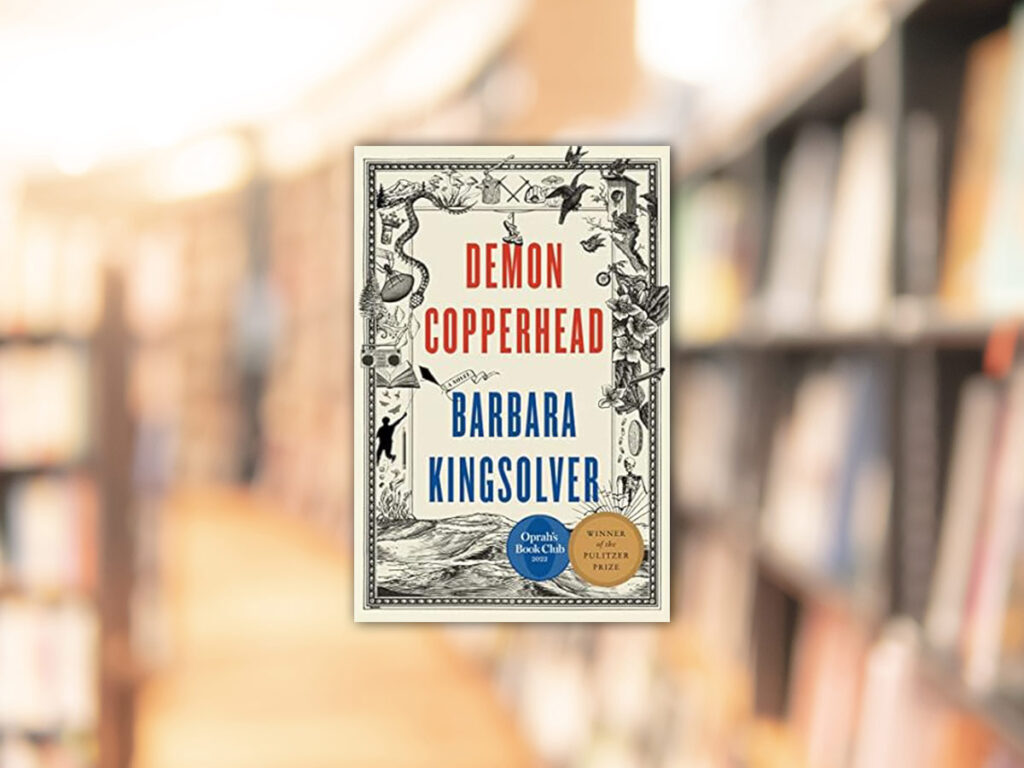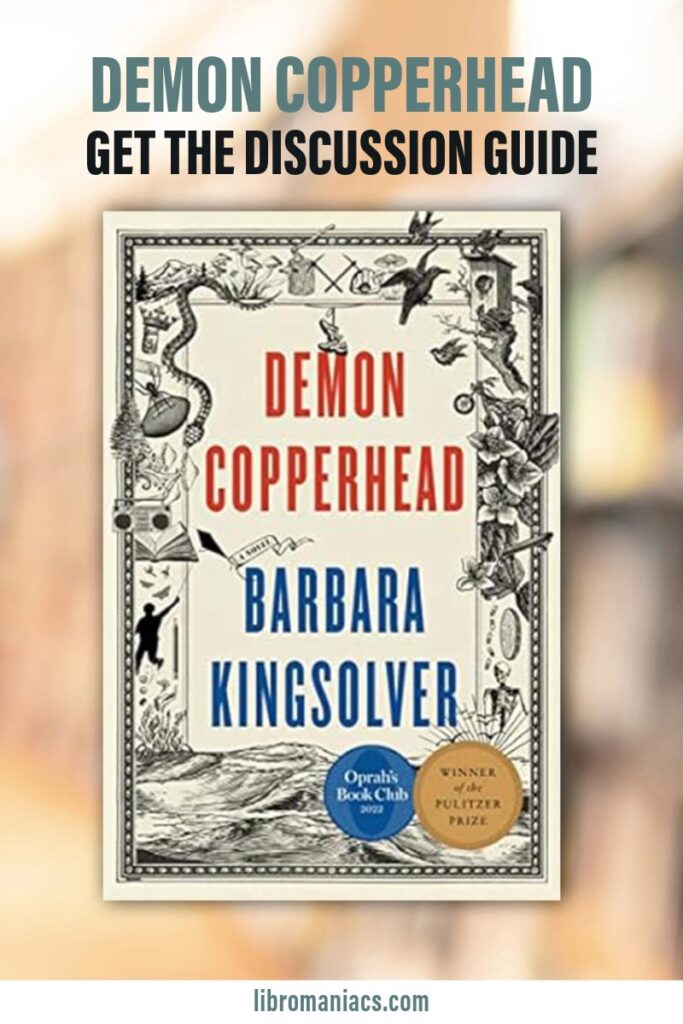Demon Copperhead is a modern retelling of Charles Dickens’ classic novel, David Copperfield. This in-depth guide for your book club group offers a firsthand look into the struggles and exploitation that the people of rural Appalachia have endured. The book’s central themes are loss and abandonment, social inequality, generational poverty, and the vicious cycles that addictions can cause.
This book has some tough content! Get ready to dive into it using our extensive Demon Copperhead book club questions. The guide also features a book synopsis, and selected reviews from previous readers (to see if you agree). Also, at the very end of the guide are some book suggestions if you enjoyed reading Demon Copperhead.

(This article contains affiliate links. This means that if you choose to purchase, I’ll make a small commission.)
Demon Copperhead Synopsis
(We always chose to provide the publisher synopsis because we feel that it’s worthwhile to discuss whether the official book description actually squared with your experience of the book.)
Demon Copperhead, Barbara Kingsolver
Set in the mountains of southern Appalachia, Demon Copperhead is the story of a boy born to a teenaged single mother in a single-wide trailer, with no assets beyond his dead father’s good looks and copper-colored hair, a caustic wit, and a fierce talent for survival. Relayed in his own unsparing voice, Demon braves the modern perils of foster care, child labor, derelict schools, athletic success, addiction, disastrous loves, and crushing losses. Through all of it, he reckons with his own invisibility in a popular culture where even the superheroes have abandoned rural people in favor of cities.
Many generations ago, Charles Dickens wrote David Copperfield from his experience as a survivor of institutional poverty and its damages to children in his society. Those problems have yet to be solved in ours. Dickens is not a prerequisite for readers of this novel, but he provided its inspiration. In transposing a Victorian epic novel to the contemporary American South, Barbara Kingsolver enlists Dickens’ anger and compassion, and above all, his faith in the transformative powers of a good story. Demon Copperhead speaks for a new generation of lost boys, and all those born into beautiful, cursed places they can’t imagine leaving behind.
10 Demon Copperhead Book Club Questions
These questions have been tailored to this book’s specific reading experience, but if you want more ideas, we also have an article with 101 generic book club questions.
- How does Kingsolver use David Copperfield as a blueprint for her novel? How does this parallelism add to the characters and themes of Demon Copperhead?
- The novel exposes some of the systematic problems found in Appalachia. How does the Kingsolver subvert the stereotypes of rural America?
- How do the characters of Angus and Emmy compare? What do you think saves Angus from following a similar fate as Emmy?
- Demon Copperhead is filled with many different colorful characters, which do you identify with the most (or least)? And why?
- Kingsolver’s story opens with a memorable line “First, I got myself born…” The opening line in David Copperfield says, in part, “…To begin my life with the beginning of my life, I record that I was born…”
What’s the significance of these lines? How do they relate to one another? How does this introduction foreshadow a lot about Demon’s life?
- Demon lived in the homes of the McCobbs, Winfields, and Aunt Betsy. How do they each differ? How do they each affect his view of family? Which home was the best for him overall?
- What is the importance of nicknames in this novel? Why don’t the characters go by their given names?
- Of all of Demon’s antagonists throughout the novel, who do you think was the worst to him? Explain your reasoning.
- The epigraph quotes this famous line from David Copperfield: “It’s in vain to recall the past, unless it works some influence upon the present.”
Why do you think Kingsolver chose to use it?
- Why is the city so shocking and difficult for Demon? What might it mean that “there was no outside anywhere?” Aside from its problems, what did the rural environment of Lee County offer him and others that was valuable?
- BONUS QUESTION: Dickens’ David Copperfield is the inspiration for Demon Copperhead. Have you read it? Discuss the similarities and differences between the two novels. Also, how well do you think Kingsolver has rewritten Dickens’ story for the modern age?
Selected Reviews of Demon Copperhead
(Use these selected Goodreads reviews to compare with your own experience of the book. Do you agree or disagree with the reviews?)
“A disappointment from one of my favorite authors. Lots of yucky stuff here–especially rampant drug abuse–making for a waste of good writing; as one reviewer said, “The word bleak is a cheerful way to describe it.” The characters–all but a couple of them–make horrible choices, but of course it’s not their fault because the world is stacked against the region they live in. The author makes explicit her resentment of the stereotypes the rest of the world applies to the region and the people who live there, but it seems to me that she does more to advance those stereotypes than to undermine them.”
“My gal Kingsolver has hit it out of the park with this spectacular retelling of David Copperfield, set in the Appalachian mountains amidst the opioid epidemic. It’s here I should say, I am a big Dickens fan, and so I was predisposed to love this, and I did. This is great, sprawling, epic storytelling. Kingsolver takes all the best parts of the Dickens original and shapes them into if of the best social realism novels I have read in some time…”
“Living in southwest Virginia and esteeming Dickens, I was initially intrigued by the plot device/schtick. What I found was mostly dreadful, even if the writing is above average. The characters are shallow and passive, frequently lacking substantial agency, and rarely (if ever) forced to make decisions requiring substantial cost. Everything terrible happen to them, and even the self-inflicted wounds are fatalistically scripted…”
“4.5 stars— David Copperfield is my favorite novel and has a preeminent place in my heart, so I was captivated by the way Barbara Kingsolver translated the story into such a foreign time and place from the original, which in tragic essentials turned out to be not so different than the bleakest bits of Victorian England. I loved seeing the way each of the characters were interpreted in this version, and was interested by the variations she made. I really appreciated how she stayed true to the spirit of Dickens’ story. By the end, I felt deeply fulfilled by this story of a boy becoming a man amidst so much tragedy, loss, growth, and ultimate redemption.”
Books Like Demon Copperhead
Demon Copperhead was both a Pulitzer winner and an Oprah pic. If you’d like more of either, here are a few suggestions– our book club guide for The Night Watchman (Louise Erdrich) also features themes of poverty within a marginalized community. Our book club guide for The Invention of Wings (Sue Monk Kidd) explores the wounds caused by slavery. And if you like retellings, try our guide for James by Percival Everett, which is an alt version of Huck Finn.

In the Wild Light, Jeff Zentner
A coming-of-age novel about two best friends from a small Appalachian town. Cash and his best friend, Delaney, get full rides to an elite prep school. While there, have their friendship tested. A story about addictions, friendships and families, love and loss, and the healing powers of poetry.

Long Bright River, Liz Moore
This story is centered around the opioid crisis in a Philadelphia neighborhood. Two sisters whose lives couldn’t be any more different. One is an addict who goes missing while working as a prostitute on the streets and the other is a police officer protecting the streets. A moving story of sisters, impacts of drug addiction, and the formidable ties that persist between place, family, and fate.

A Thousand Acres, Jane Smiley
Like Copperhead, this book is also a re-imaging of a classic and a Pulitzer winner.
In this case, Smiley is offering up a retelling Shakespeare’s King Lear. The story centers around a wealthy Iowa farmer who decides to divide his farm among his three daughters. The events that follow, motion a chain of events that bring dark truths to light. Main themes found in the story are generational conflict, inheritance of land, and perceived gender roles.
Have a listen on Audible. Try audio books for free for 30 days.
Share these Demon Copperhead book club questions with your friends:

